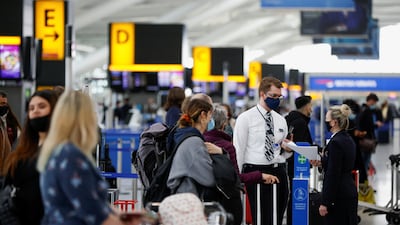Travel latest: UK slashes red list to seven countries
The UK government has lifted its advice against non-essential travel to 32 countries and territories.
Bangladesh, Fiji, Gambia, Ghana and Malaysia are among the locations for which travel advice based on the risk of coronavirus has been relaxed, the Foreign, Commonwealth and Development Office (FCDO) said.
The UK will stop advising Britons to avoid all but essential travel to non-red list countries on Covid-19 grounds except in “exceptional circumstances”, such as if the local healthcare system is overwhelmed, the FCDO said.
This will make it easier for people visiting those locations to obtain travel insurance.
Before Wednesday’s changes, the FCDO advised against non-essential travel to 117 countries and territories owing to the virus.
Advice is expected to be lifted for more locations in the coming days.
The FCDO said the change in policy followed “improved public health in many countries” and the “decreased risk to British nationals” as a result of the administration of vaccines.
There has also been an easing of the government’s rules for travellers entering the UK, with the traffic light system scrapped on Monday.
Fully vaccinated residents – and unvaccinated under-18s – from more than 50 countries and territories can now arrive without taking a pre-departure lateral flow test, a day-eight post-arrival PCR test, or having to self-isolate.
Foreign Secretary Liz Truss said: “These rule tweaks will make travelling more straightforward, supporting businesses and families right across Britain – and allow more of us to see friends and loved ones with greater peace of mind.
“We’re striking the right balance between keeping people safe, which remains our priority, and giving them the freedom to exercise personal responsibility, while supporting the travel sector as it continues to recover.”
The full list of countries for which the FCDO has eased its travel advice is: Algeria; Armenia; Bangladesh; Belarus; Benin; Comoros; Tokelau and Niue; Djibouti; Equatorial Guinea; Fiji; Gambia; Guinea; Kazakhstan; Kiribati; Kosovo; Liberia; Madagascar; Malaysia; Marshall Islands; Micronesia; Nauru; Sao Tome and Principe; Senegal; Solomon Islands; Togo; Tonga; Tuvalu; Vanuatu; Congo; America Samoa; French Polynesia; and Ghana.
The FCDO will continue to advise against all but essential travel for all red list countries where the risk to British citizens is deemed to be “unacceptably high”.
Meanwhile, the government is expected to announce on Thursday that it will reduce the red list.
There are currently 54 countries on the list, including Mexico, Cuba, all of mainland South America, and southern and eastern Africa.
Anyone arriving in the UK from a location in the red tier must spend 11 nights in a quarantine hotel.
This costs £2,285 ($3,100) for solo travellers, making such trips too expensive for many people.
A decision on which countries will be removed from England’s red list is expected to be made following a meeting of government ministers on Thursday.
The devolved governments in Scotland, Wales and Northern Ireland set their own travel rules but have recently mirrored announcements made in Westminster.
Paul Charles, chief executive of travel consultancy The PC Agency, which led the Save Our Summer campaign, said the overhaul to the red list was "not before time".
He predicted there would be "very few countries left" on the list after the announcement and Mexico was one of the more popular destinations likely to be opened up to British travellers.
More remote countries, such as Afghanistan, Haiti and Somalia will remain on the red list, with the “blanket measures on Africa and South America removed”.
"There is no justification for having so many countries on the red list. There's no evidence of new variants and that Covid is out of control," he told The National.















